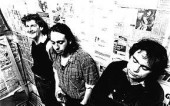Hey, this is a fan page. But I, also, am a musician. Needless to say, I would not be where I am today without the Dead C. Thank you, Dead C.
Taken from Wikipedia:
The Dead C are a New Zealand based noise rock trio made up of members Bruce Russell, Michael Morley and Robbie Yeats. Most often, Russell plays electric guitar, Morley sings and plays electric guitar or laptop, and Yeats plays drums.
Formed in Dunedin in 1986, the group is known for its lo-fi guitar soundscapes and improvisational take on rock music. They became known internationally through their releases on the Philadelphia record label Siltbreeze, especially the 1992 double LP Harsh 70s Reality. Early, pre-Siltbreeze albums like Eusa Kills and DR503 find the group still drifting between song-based work and the experimental free rock found in later albums like The White House and Tusk. Recent albums have seen the group add electronics and samples, yet still maintaining their origins in trademark hazy guitar chaos.
The group performs very infrequently outside of New Zealand, although they did come to the USA in March 2002 to perform at the All Tomorrow's Parties festival, as well as a couple of gigs in Los Angeles and San Francisco. They also performed for the first time in Europe in May 2004 at Le Weekend, an electronic music festival in Stirling, Scotland.
Taken from All Music Guide:
"Forerunners of post-rock and the modern-day revival of space rock, the Dead C were an improvisational, hugely prolific noise-rock fuckadelia. Challenging and mostly instrumental, they were a definite anomaly on the New Zealand scene, which was still known primarily for the jangly collegiate pop of the Flying Nun label when the band first emerged in the late 80s. Perhaps in part for that reason, the Dead C didn't attract much of a fan base in their home country; their audience was mostly international, developed initially through fanzine culture and word of mouth. They did, however, help spark a more experimental music scene around their native Dunedin, which was centered around bassist Bruce Russell's Xpressway label and boosted the careers of musicians like Alistair Galbraith and Peter Jefferies. They also influenced a broad range of bands, from the ambient post-rock of Flying Saucer Attack and Labradford to the neo-psychedelia of Bardo Pond to lo-fi indie-rockers like Pavement and Sebadoh. The Dead C's own music held elements of all those styles, and remained essentially the same for most of the band's life: murky, hazy, loosely structured drone rock, enveloped in a thick crust of avowedly low-fidelity guitar noise, and often warped with tape manipulations or studio treatments. Consistent almost to a fault, their catalog was generally very much of a piece, with minor variations here and there; this, combined with its size and scarcity, could make finding entry difficult, but experimental rock enthusiasts often found the rewards worth pursuing. The Dead C was formed in Dunedin, New Zealand in 1987, with a lineup of guitarist/occasional vocalist Michael Morley (a onetime member of the evocatively named Wreck Small Speakers on Expensive Stereos), bassist and Xpressway label head Bruce Russell, and drummer Robbie Yeats (formerly of the well-liked Kiwi pop band the Verlaines). In keeping with the early formats of Xpressway and Morley's own Precious Metal imprint, their earliest releases were only available on limited-run cassettes, but they also hooked up with Flying Nun in 1988 to issue their first LP, DR503 (which was retitled DR503b and DR503c for later reissues). A second Flying Nun LP, Eusa Kills, appeared in 1989 and featured a bizarre cover of T. Rex's "Children of the Revolution." The Dead C next forged a relationship with the Philadelphia-based indie Siltbreeze, which would issue the majority of their output over the 90s. The first was 1990's Helen Said This, which was later reissued on CD as part of a two-fer with the formerly cassette-only Trapdoor Fucking Exit (the latter's title was used for the CD). 1992's double-LP set Harsh 70s Reality is regarded by most as a high point -- perhaps the high point -- of the band's career, ranging from relatively concise songs to the side-long jam "Driver U.F.O." In its wake, Morley and Russell both launched side projects -- Gate and A Handful of Dust, respectively -- that allowed them to pursue even more esoteric avenues. A flood of Dead C material followed over 1993-94 as well: the improvisational The Operation of the Sonne, the outtakes/archival collection World Peace Hope Et Al (on the British label Shock), and the live album Clyma Est Mort. The Dead C hit another creative high point with 1995's The White House, another fan favorite that brought a touch more structure to the group's usually free-form compositions. Another live album, Repent, followed in 1996, while the next year's Tusk -- titled ironically after the Fleetwood Mac album -- proved to be their last effort for Siltbreeze. It also marked the end of their most prolific period, as the band subsequently spent an astonishing (for them) three years off record. They weren't inactive, though; when they finally returned in 2000, it was with an eponymously titled double-CD release of sessions conducted from 1995-99. The Dead C was released on the band's new Language Recordings label, which allowed them greater financial control. Their second Language album, 2002's New Electric Music, was the most electronically oriented item in their large discography to date. 2003's The Damned found a more widespread American release via the Starlight Furniture label."
This profile was edited with yourspacecodes.com Editor
